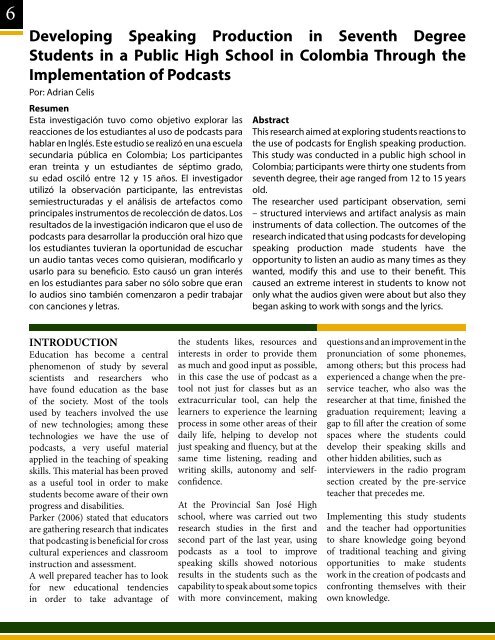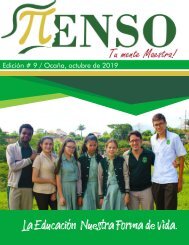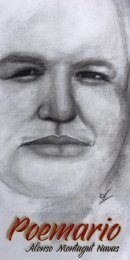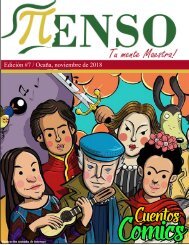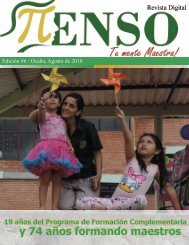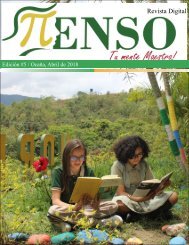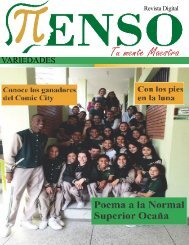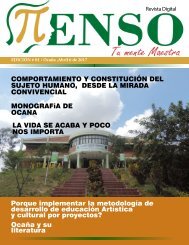You also want an ePaper? Increase the reach of your titles
YUMPU automatically turns print PDFs into web optimized ePapers that Google loves.
6<br />
Developing Speaking Production in Seventh Degree<br />
Students in a Public High School in Colombia Through the<br />
Implementation of Podcasts<br />
Por: Adrian Celis<br />
Resumen<br />
Esta investigación tuvo como objetivo explorar las<br />
reacciones de los estudiantes al uso de podcasts para<br />
hablar en Inglés. Este estudio se realizó en una escuela<br />
secundaria pública en Colombia; Los participantes<br />
eran treinta y un estudiantes de séptimo grado,<br />
su edad osciló entre 12 y 15 años. El investigador<br />
utilizó la observación participante, las entrevistas<br />
semiestructuradas y el análisis de artefactos como<br />
principales instrumentos de recolección de datos. Los<br />
resultados de la investigación indicaron que el uso de<br />
podcasts para desarrollar la producción oral hizo que<br />
los estudiantes tuvieran la oportunidad de escuchar<br />
un audio tantas veces como quisieran, modificarlo y<br />
usarlo para su beneficio. Esto causó un gran interés<br />
en los estudiantes para saber no sólo sobre que eran<br />
lo audios sino también comenzaron a pedir trabajar<br />
con canciones y letras.<br />
Abstract<br />
This research aimed at exploring students reactions to<br />
the use of podcasts for English speaking production.<br />
This study was conducted in a public high school in<br />
Colombia; participants were thirty one students from<br />
seventh degree, their age ranged from 12 to 15 years<br />
old.<br />
The researcher used participant observation, semi<br />
– structured interviews and artifact analysis as main<br />
instruments of data collection. The outcomes of the<br />
research indicated that using podcasts for developing<br />
speaking production made students have the<br />
opportunity to listen an audio as many times as they<br />
wanted, modify this and use to their benefit. This<br />
caused an extreme interest in students to know not<br />
only what the audios given were about but also they<br />
began asking to work with songs and the lyrics.<br />
INTRODUCTION<br />
Education has become a central<br />
phenomenon of study by several<br />
scientists and researchers who<br />
have found education as the base<br />
of the society. Most of the tools<br />
used by teachers involved the use<br />
of new technologies; among these<br />
technologies we have the use of<br />
podcasts, a very useful material<br />
applied in the teaching of speaking<br />
skills. This material has been proved<br />
as a useful tool in order to make<br />
students become aware of their own<br />
progress and disabilities.<br />
Parker (2006) stated that educators<br />
are gathering research that indicates<br />
that podcasting is beneficial for cross<br />
cultural experiences and classroom<br />
instruction and assessment.<br />
A well prepared teacher has to look<br />
for new educational tendencies<br />
in order to take advantage of<br />
the students likes, resources and<br />
interests in order to provide them<br />
as much and good input as possible,<br />
in this case the use of podcast as a<br />
tool not just for classes but as an<br />
extracurricular tool, can help the<br />
learners to experience the learning<br />
process in some other areas of their<br />
daily life, helping to develop not<br />
just speaking and fluency, but at the<br />
same time listening, reading and<br />
writing skills, autonomy and selfconfidence.<br />
At the Provincial San José High<br />
school, where was carried out two<br />
research studies in the first and<br />
second part of the last year, using<br />
podcasts as a tool to improve<br />
speaking skills showed notorious<br />
results in the students such as the<br />
capability to speak about some topics<br />
with more convincement, making<br />
questions and an improvement in the<br />
pronunciation of some phonemes,<br />
among others; but this process had<br />
experienced a change when the preservice<br />
teacher, who also was the<br />
researcher at that time, finished the<br />
graduation requirement; leaving a<br />
gap to fill after the creation of some<br />
spaces where the students could<br />
develop their speaking skills and<br />
other hidden abilities, such as<br />
interviewers in the radio program<br />
section created by the pre-service<br />
teacher that precedes me.<br />
Implementing this study students<br />
and the teacher had opportunities<br />
to share knowledge going beyond<br />
of traditional teaching and giving<br />
opportunities to make students<br />
work in the creation of podcasts and<br />
confronting themselves with their<br />
own knowledge.


